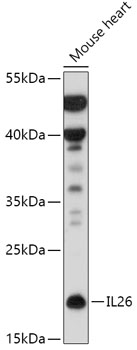Cell Biology Antibodies 13
Anti-IL-26 Antibody (CAB17729)
- SKU:
- CAB17729
- Product Type:
- Antibody
- Reactivity:
- Mouse
- Host Species:
- Rabbit
- Isotype:
- IgG
- Antibody Type:
- Polyclonal Antibody
- Research Area:
- Cell Biology
Description
| Antibody Name: | IL26 Rabbit Polyclonal Antibody |
| Antibody SKU: | CAB17729 |
| Antibody Size: | 20uL, 50uL, 100uL |
| Application: | WB |
| Reactivity: | Mouse |
| Host Species: | Rabbit |
| Immunogen: | Recombinant fusion protein containing a sequence corresponding to amino acids 22-100 of human IL26 (NP_060872.1). |
| Application: | WB |
| Recommended Dilution: | WB 1:500 - 1:2000 |
| Reactivity: | Mouse |
| Positive Samples: | Mouse heart |
| Immunogen: | Recombinant fusion protein containing a sequence corresponding to amino acids 22-100 of human IL26 (NP_060872.1). |
| Purification Method: | Affinity purification |
| Storage Buffer: | Store at -20°C. Avoid freeze / thaw cycles. Buffer: PBS with 0.02% sodium azide, 50% glycerol, pH7.3. |
| Isotype: | IgG |
| Sequence: | KHKQ SSFT KSCY PRGT LSQA VDAL YIKA AWLK ATIP EDRI KNIR LLKK KTKK QFMK NCQF QEQL LSFF MEDV FGQL QLQ |
| Gene ID: | 55801 |
| Uniprot: | Q9NPH9 |
| Cellular Location: | |
| Calculated MW: | |
| Observed MW: | 20kDa |
| Synonyms: | AK155, IL-26, IL26 |
| Background: | This gene was identified by its overexpression specifically in herpesvirus samimiri-transformed T cells. The encoded protein is a member of the IL10 family of cytokines. It is a secreted protein and may function as a homodimer. This protein is thought to contribute to the transformed phenotype of T cells after infection by herpesvirus samimiri. [provided by RefSeq, Jul 2008] |
| UniProt Protein Function: | IL26: May play a role in local mechanisms of mucosal immunity and seems to have a proinflammatory function. May play a role in inflammatory bowel disease. Activates STAT1 and STAT3, MAPK1/3 (ERK1/2), JUN and AKT. Induces expression of SOCS3, TNF-alpha and IL-8, secretion of IL-8 and IL-10 and surface expression of ICAM1. Decreases proliferation of intestinal epithelial cells. Is inhibited by heparin. Belongs to the IL-10 family. |
| UniProt Protein Details: | Protein type:Cytokine; Secreted, signal peptide; Secreted Chromosomal Location of Human Ortholog: 12q15 Cellular Component: cytosol; extracellular space Molecular Function:cytokine activity Biological Process: cell-cell signaling; immune response; inflammatory response; negative regulation of epithelial cell proliferation; positive regulation of cytokine secretion; positive regulation of JAK-STAT cascade; positive regulation of protein kinase B signaling cascade; positive regulation of stress-activated MAPK cascade; positive regulation of transcription from RNA polymerase II promoter |
| NCBI Summary: | This gene was identified by its overexpression specifically in herpesvirus samimiri-transformed T cells. The encoded protein is a member of the IL10 family of cytokines. It is a secreted protein and may function as a homodimer. This protein is thought to contribute to the transformed phenotype of T cells after infection by herpesvirus samimiri. [provided by RefSeq, Jul 2008] |
| UniProt Code: | Q9NPH9 |
| NCBI GenInfo Identifier: | 17366984 |
| NCBI Gene ID: | 55801 |
| NCBI Accession: | Q9NPH9.1 |
| UniProt Related Accession: | Q9NPH9 |
| Molecular Weight: | 19,843 Da |
| NCBI Full Name: | Interleukin-26 |
| NCBI Synonym Full Names: | interleukin 26 |
| NCBI Official Symbol: | IL26 |
| NCBI Official Synonym Symbols: | AK155; IL-26 |
| NCBI Protein Information: | interleukin-26 |
| UniProt Protein Name: | Interleukin-26 |
| UniProt Synonym Protein Names: | Protein AK155 |
| Protein Family: | Interleukin |
| UniProt Gene Name: | IL26 |
| UniProt Entry Name: | IL26_HUMAN |







